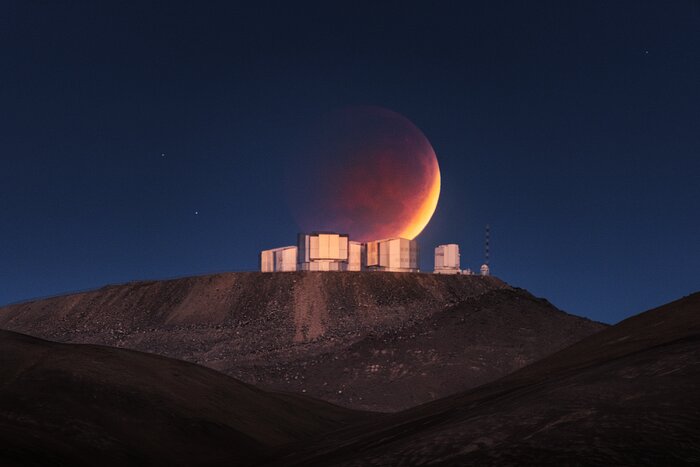Eclissa di Luna al Paranal
Come Atlante che sorregge il cielo nel mito greco antico sembra che il Very Large Telescope (VLT) dell'ESO sostenga la Luna in questa straordinaria immagine di un'eclissi lunare totale all'osservatorio di Paranal nel deserto di Atacama in Cile. La fotografia è stata scattata il 26 maggio 2021 dall'astrofotografo Yuri Beletsky ed è presente nel calendario ESO 2022.
Per scattare questa foto della settimana, è stata necessaria una pianificazione dettagliata da parte del fotografo. Calcoli accurati gli hanno permesso di individuare una posizione a nove chilometri a est di Paranal, dove l'eclissi lunare al tramonto sarebbe stata brevemente visibile appena sopra le cupole dei telescopi, brillando debolmente nel primo crepuscolo del mattino.
Un'eclissi lunare totale si verifica quando il Sole, la Terra e la Luna si allineano, con la Terra tra il Sole e la Luna. L'ombra della Terra blocca la luce solare diretta, così che l'unica luce riflessa dalla superficie della Luna è quella che è stata rifratta dall'atmosfera terrestre, dando alla Luna un colore rossastro. Poiché la luce del sole è filtrata dall'atmosfera terrestre, gli astronomi spesso usano le eclissi lunari per capire le firme che la vita può imprimere nell'atmosfera, il che è estremamente utile nella nostra ricerca della vita su altri pianeti.
Questa immagine è presente nel mese di aprile nel calendario ESO 2022. Se volete comprarne una copia, potete trovarla sul nostro sito online ESOshop Le consegne inizieranno a metà settembre. Il calendario misura 49 x 39 cm quando è imballato e ha 14 pagine, con un dorso in cartone. Viene consegnato in una scatola di cartone. All'interno, sono indicate anche le fasi lunari e splendide immagini astronomiche insieme a foto mozzafiato dei telescopi e dei paesaggi dell'ESO vi accompagneranno ogni mese.
Crediti:Y. Beletsky (LCO)/ESO
A proposito dell'immagine
| Identificazione: | potw2136a |
| Lingua: | it |
| Tipo: | Fotografico |
| Data di pubblicazione: | Lunedì 06 Settembre 2021 06:00 |
| Dimensione: | 7360 x 4912 px |
A proposito delll'oggetto
| Nome: | Moon |
| Tipo: | Solar System : Planet : Satellite Unspecified : Technology : Observatory |
